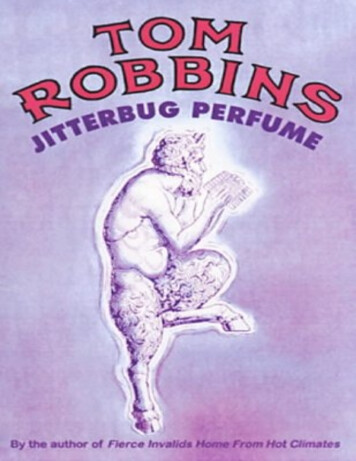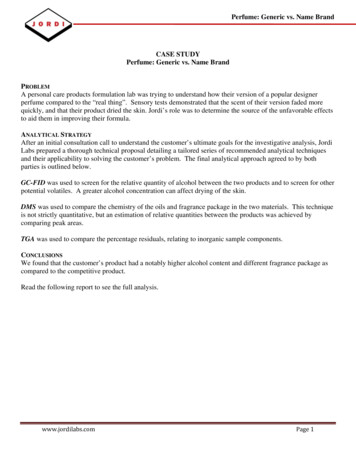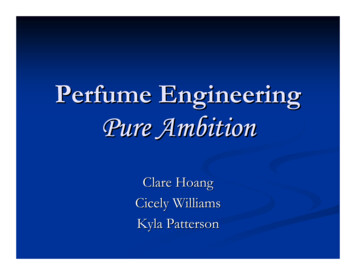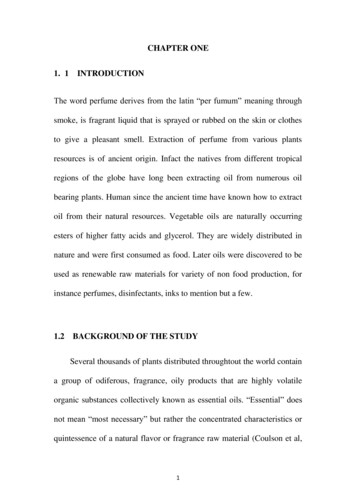
Transcription
JITTERBUG PERFUMETom Robbinse-book ver.1.0FOR DONNA AND THE WATER MUSICfor those whose letters I still haven't answeredAll rights reserved.Copyright 1984 by Tibetan Peach Pie Incorporated.The author is grateful to his agent and friend, Phoebe Larmore; to his intrepideditor, Alan Rinzler; to Laren Elizabeth Stover, who passed him fragranceindustry secrets in lipsticked envelopes; and to Jessica Maxwell, whose ancestoronce owned a perfume shop in New Orleans, and who traded him that shop for aflying conch shell.The distinctive human problem from time immemorial has been the need tospiritualize human life, to lift it onto a special immortal plane, beyond the cyclesof life and death that characterize all other organisms.—ERNEST BECKERThe history of civilization is the story of man's emancipation from a lot that washarsh, brutish, and short. Every step of that upward climb to a sophisticated wayof life has been paralleled by a corresponding advance in the art of perfumery.—ERIC MAPLERage, rage against the dying of the light.
— DYLAN THOMAS(And) always smell as nice as possible.—LYNDA BARRYTODAY'S SPECIALTHE BEET IS THE MOST INTENSE of vegetables.The radish, admittedly, is more feverish, but the fire of the radish is a cold fire,the fire of discontent not of passion. Tomatoes are lusty enough, yet there runsthrough tomatoes an undercurrent of frivolity. Beets are deadly serious.Slavic peoples get their physical characteristics from potatoes, their smolderinginquietude from radishes, their seriousness from beets.The beet is the melancholy vegetable, the one most willing to suffer. You can'tsqueeze blood out of a turnip . . .The beet is the murderer returned to the scene of the crime. The beet is whathappens when the cherry finishes with the carrot. The beet is the ancient ancestorof the autumn moon, bearded, buried, all but fossilized; the dark green sails ofthe grounded moon-boat stitched with veins of primordial plasma; the kite stringthat once connected the moon to the Earth now a muddy whisker drillingdesperately for rubies.The beet was Rasputin's favorite vegetable. You could see it in his eyes.In Europe there is grown widely a large beet they call the mangel-wurzel.Perhaps it is mangel-wurzel that we see in Rasputin. Certainly there is mangelwurzel in the music of Wagner, although it is another composer whose name
begins, B-e-e-t——.Of course, there are white beets, beets that ooze sugar water instead of blood, butit is the red beet with which we are concerned; the variety that blushes andswells like a hemorrhoid, a hemorrhoid for which there is no cure. (Actually,there is one remedy: commission a potter to make you a ceramic asshole—andwhen you aren't sitting on it, you can use it as a bowl for borscht.)An old Ukrainian proverb warns, "A tale that begins with a beet will end withthe devil."That is a risk we have to take.SEATTLEPRISCILLA LIVED IN A STUDIO APARTMENT.It was called a "studio" apartment because art is supposed to be glamorous andlandlords have a vested interest in making us believe that artists prefer to sleep intheir workrooms. Real artists almost never live in studio apartments. There isn'tenough space, and the light is all wrong. Clerks live in studio apartments. Fileclerks, shop clerks, law clerks, community college students, elderly widows, andunmarried waitresses such as Priscilla.The building in which this particular studio apartment donned its false beret wasbuilt during the Great Depression. In Seattle there are many such buildings,anointing their bricks in the rain on densely populated hillsides between LakeWashington and Elliott Bay. Architecturally, its plain facade and straight linesechoed the gown Eleanor Roosevelt wore to the inaugural ball, while its interiorwalls still reproduced faithfully the hues of the split pea mush dished up inhundreds of soup kitchens. Over the years, the building had been so lived in that
it had acquired a life of its own. Every toilet bowl gurgled like an Italian tenorwith a mouthful of Lavoris, and the refrigerators made noises at night likebuffalo grazing.Most older studio apartments—the ones in those buildings of New Deal brick—harbored odors as definitive as their colors and sounds, odors arrived at throughgenerations of salmon cakes frying and broccoli boiling, but here was wherePriscilla's apartment differed. It smelled of chemicals—less mephitic than sweet—and it was that smell that leaped to greet her, like a cooped-up pooch, whenshe let herself in on a weary midnight.The first thing she did after switching on the overhead light was to kick off herlow-heeled waitress shoes. The second thing she did was to stub a toe on a tableleg. The table, at which innumerable widows had sat down to canasta, shudderedparoxysmally, causing beakers of chemicals to rattle and sway. Fortunately,merely a few drops of their contents were lost.Priscilla flopped on the couch that was also her bed and massaged her feet,devoting special attention to the affronted toe. "Goddamnit," she said. "I'm sucha klutz. I don't deserve to live in this world. I ought to be sent to one of thoseplanets where there isn't any gravity."Earlier that evening, at the restaurant, she'd dropped a whole tray of cocktails.Inside her hose, her feet were as red as newborn mice. Steam seemed to risefrom them. Mouse gas. She rubbed her feet until they felt comforted, then sherubbed her eyes. With a sleepy sigh, she let herself topple over on the couch,only to be startled by a shower of silver coins. The evening's tips had cascadedfrom her pockets and scattered about her head and body, the couch and floor.She watched a dime roll across the worn carpet as if heading for the exit. "Is thiswhat they mean by runaway inflation?" she asked. "Come back here, youcoward!"Sighing again, she arose and gathered the money. The few crumpled bills shestuffed in her purse, the coins she trickled into a dusty fishbowl on the dresser.The bowl was full to overflowing. "Tomorrow I'll open a bank account," shevowed. She had made that vow before.She removed her uniform—a blue sailor dress with piping of white and red—andtossed it in a corner. At the bathroom sink in her panty hose and bra, she washed
her hair. She felt too tired to wash her hair, but it so reeked of cook grease andcigarette smoke that it competed with the resident smell of the apartment, andthat would never do. There was no cap for the shampoo bottle. In feet, shecouldn't remember when it—or the toothpaste—had last had a cap. "I could havesworn there was a cap on it when I bought it," she said.A number of short, curly hairs were stuck to the cake of soap. They made herwince. The hairs reminded her of an incident at work. She and Ricki usually tooktheir breaks together. They would lock themselves in the employees' washroomand smoke a joint or blow a line of coke. Anything to lighten the load of thetrays. Inevitably, Ricki made lewd suggestions. Sometimes, she'd casually layher hands on Pris-cilla's body. Priscilla was not really offended. Ricki was one ofthe few people on the restaurant staff who could read something moreintellectually demanding than a menu. Moreover, she was pretty, in a dank,faintly mustachioed way. Perhaps Priscilla was obliquely titillated by Ricki'sadvances. Usually, she brushed them off in a manner that made them both laugh.On this night, however, when, on the pretext of leveling a molehill that allegedlyhad bunched up in Priscil-la's panty hose, Ricki administered to the back of herupper thigh with lengthy and ever-widening caresses, Priscilla had snapped ather and punched her hard on the arm. At the end of the shift, Priscillaapologized. "I'm just tired," she told Ricki. "I'm truly goddamned exhausted."Ricki said that it was okay, but said it in a tone that intimated damage below thewaterline of their friendship. Priscilla brooded over this as she plucked severalpubes from the soap.The secondary function of a bathroom mirror is to measure murmurs in mentalmud. Priscilla glanced at her "seismograph" and disliked the reading. She was aspallid as a Q-tip and as ready to unravel. Dropping the soap in the sink, sheimposed a smile on her reflection. With a sudsy finger she pushed at thetriangular tip of her crisp little corn chip of a nose. She winked each eye. Hereyes were equally enormous, equally violet, but the left eye winked smoothlywhile the right required effort and a scrunching of flesh. She tugged at her wetautumn-colored hair as if she were stopping a trolley. "You're still cute as abutton," she told herself. "Of course, I've never seen a-cute button, but who am Ito argue with the wisdom of the ages?" She puckered her bubble gum mouthuntil its exaggerated sensuality drew attention away from the blood-bluecrescents beneath her eyes. "My bags may be packed, but I haven't left town. Nowonder Ricki finds me irresistible. She's only human."
Leaning her forehead against the scummy rim of the sink, Priscilla suddenlywept. She continued weeping until the heat of her tear water, the sheer velocityof its flow, finally obscured the already vague circumstances of its origins. Then,as memory after memory relinquished its sharp focus, and even fatigue andloneliness proved water soluble, she shut her tear ducts with an almost audibleresolve. She blew her nose on a washcloth (she had been out of toilet tissue for aweek), tossed her clammy hair, pulled on a lab coat over her underwear, andstepped into the living room cum bedroom cum laboratory where, over anassortment of burners, beakers, and bubbling glass tubing, she would toil withuncharacteristic fastidiousness until dawn.In the life of Priscilla, the genius waitress, this night was fairly routine. Itdiffered significantly from every other night of her year in but one respect: atwhat she reckoned to be about five in the morning—her clock had run down andshe hadn't gotten around to winding it—there was a soft rapping at her door.Since her neighborhood, Capitol Hill, was a high-crime district and since she hadno wish to be interrupted by Ricki or some man she'd once slept with out of needand then forgotten, she'd chosen not to answer. At sunup, however, just prior toretiring for her customary and inadequate six hours of rest, she cracked the doorto see whether her caller had left a note. She was puzzled to find on her doorsilla solitary lump of something, which, after cautious examination, she identifiedas a beet.NEW ORLEANS"WHAT IS THE HOUR, V'LU?""Dee whut?""The hour. What is the hour?"
"Why, ma'am, dee hour is whut is on dee clock. Tween dee numbers.""V'lu!" said Madame Devalier. When Madame Devalier raised her voice, it waslike Diamond Jim raising a poker pot. Even the termites in the foundation paidattention. "What time is it?""It three o'clock, ma'am."Madame Devalier clasped the overbite of her bosom in disbelief. "Three o'clockin the morning!""Three o'clock in dee night, ma'am. You knows dat in New Orleans it notmorning 'til dee sun come up." V'lu laughed. Her laughter resembled the tinkleof a toy xylophone. "Sometime, when dee hurricane drops be passing 'round, itnot git morning all day.""You are correct, as usual, cherie. But let us not be speaking of hurricane drops.Nothing goes out of this shop but perfume. And what perfume! Three o'clock inthe morn—in the night! This boof has made me so dizzy I have lost all sense oftime." She peeked into a vat of percolating petals. Inside the vat the sceneresembled an Esther Williams water ballet filmed in the lagoons of hell. "This isthe strongestjasmine I have ever smelled. It makes my head spin, V'lu. We must buy fromthat Jamaican again."The Hershey-skinned maid nodded. "Dat island nigger dee talk of dee Quarter,ma'am. He be selling flowers, he be singing songs, and all de time dose honeybees buzzing 'round he head. .""That is most unusual," Madame Devalier agreed. "Sometimes they circle himlike a halo, and other times it's as if they form horns. He wears those bees like acrown, a living crown.""You think he wear dem bees to bed at night?"Madame Devalier wagged a finger at the young woman. The finger was plump,wrinkled, ringed, and tipped with a crimson nail. "If .you know what's good foryou, you won't be concerning your pretty self with his habits in bed. Now fetchme some more alcohol, cher. We must dilute this boof before it starts a chain
reaction and blows New Orleans into the Gulf. We have a jasmine Nagasakicooking here!"Indeed, a solitary wino weaving down Royal Street was aroused into momentarysobriety by the olfactory force of the aroma that seeped through the closedshutters of the small shop. The man, a longtime resident of the area, stared at thefaded sign—Parfumerie Devalier—and crossed himself before continuing on hisway.For forty years, Madame Lily Devalier had kept the shop. Her father had kept itfor fifty years before her. In its day, allegedly, some odd business had passedthrough its arched doorway. Moon medicine and jazz powders. Lucky root andcome-together potent. Mojo cream and loa lotion. Hurricane drops, kill-me-notjuice, coonass courting pomade and. a special "oil of midnight" that had nothingto do with overtime at the office. Among fashionable folk in the French Quarter,Madame D. was known as the Queen of the Good Smells. There was a timewhen certain people in the Quarter pronounced it "Spells." Nowadays, however,with much of the Quarter gone to seed—the shop along with it—Madame wastrying to reattract some of the clientele she had lost to the large internationalfragrance houses, so she dealt in perfume and nothing but perfume. Or so sheclaimed.Under her mistress's watchful eye, V'lu poured molassesdistilled alcohol into a crock. The crock had been collecting the essential oil as itdripped through a filter tube attached to the steeping vat. The Jamaican jasminewas so pungent, however, that the diluting agent barely dulled its edge."Ooh-la-la!" exclaimed Madame Devalier. She plopped down her pumpkinpatch, her Spanish ballroom, her pagan idol of a body on a lime velvet love seat."This boof may cause me to feint.""Ah gitting a sinful headache," V'lu complained.Out on Royal, following in the footsteps of the departed wino, a tall, lean blackman in a greenish yellow skullcap paused before the shutters of the ParfumerieDevalier. He sniffed the air like a stag. He sniffed again. He clapped his hands indelight and cackled aloud. And shifting a bit on his head, emitting a sleepywhisper, his skullcap stirred its many little wings.
Since there were no witnesses, it is impossible to say whether that man wasresponsible for the single garden-variety beet that V'lu discovered on her cot—tossed in through the open second-story window, perhaps—when she went to layherself down that night (and thanks to some medication strongly resemblinghurricane drops with which her employer had treated her headache, it was stillnight, wasn't it, V'lu?).PARISIN THE CENTER OF A MARBLE-TOP DESK. Directly under a crystalchandelier, sitting alone on a silver tray, was a large, raw beet. The beet musthave been out of the ground a week or more, for it had the ashen exterior of acancer victim. Yet, when struck at a particular angle by a flicker of candlelightfrom the chandelier, its heart of wine-drenched velvet shone through.The desk was in an office, the office in a skyscraper. The skyscraper was likeany other, a slender tower of steel and glass, totally without embellishment ordash. Even its height—a mere twenty-three stories—was unremarkable. Its lonedistinguishing feature was the neighborhood from whose midst it rose. Acrossthe street from its entrance was a monastery and a cathedral, the limestone stepsof which had been worn as radiant as blue serge trousers by centuries of piouscomings and goings. To the right of the building was a block of bicycle shopsand cafes; to the left a slate-roofed hotel where, a few decades past, artists hadslept and worked within the same four walls, never dreaming that their miserablecircumstances might be romanticized in the "studio apartment" market of thefuture. Above the building, the sky recalled passages from Les Miserables,threadbare and gray. Below it (everything sits on something else), were the ruinsof a brewery that once had been operated by monks from across the street. In the1200s, Crusaders returning from Palestine introduced perfume to France, and after it achieved popularity there, the monks
had made perfume as well as beer. Vestiges of the ancient perfumery could beexplored in the basement of the skyscraper. In fact, the LeFever family, whichbuilt the skyscraper, had purchased the perfume business from the monastery inthe seventeenth century and was still in the trade.On this day, already described as meteorologically evocative of Victor Hugo athis most dire, Claude LeFever had barged into the office of Marcel LeFeverunannounced. Why not? They were blood relatives and both vice-presidents ofthe firm. Surely, formalities were unnecessary. Yet Marcel seemed annoyed.Perhaps it was because he was wearing his whale mask.Claude put his hands on his hips and stared at his cousin. "Thar she blows!" heyelled."Kiss my ass," said Marcel, from inside the mask."Forgive me but I would not quite know where to look for the ass of a fish.""A whale is not a fish, you fool.""Oh, yes."(Claude and Marcel LeFever were speaking in French. This simultaneousEnglish translation is being beamed to the reader via literary satellite.)Holding degrees in both accounting and law, Claude made the financialdecisions for the LeFever family. Marcel, who had grown up in the perfumelabs, learning to think with his nose, was in charge of "creativity," a term thatClaude did not completely comprehend, but which, to his credit, he recognizedto be essential. If creativity was enhanced by pacing the executive suites in apapier-mache mask, it was all right with Claude, no matter how it frightened thesecretaries. It was Marcel's habit of making large cash donations to ecologycommandos intent upon sabotaging the whaling industry that bothered the frugalClaude. Claude was well aware of the previous importance to the perfumeindustry of ambergris, a substance secreted by temporarily infirm whales, but hewas convinced that, petrochemical and coal tar fixatives were completelyadequate substitutes. "Fish puke is a thing of the past," he'd tell Marcel."A whale is a mammal, you idiot."
"Oh, yes."In Marcel's office, as in Claude's next door, there was a floor-to-ceiling windowfrom which one could look down on the cathedral spire. "We are closer toheaven than the monks," Claude was fond of saying. On this day, however, thesky, layered with thin altostratus clouds and smog, appeared to reflect humansuffering and failed to awaken in Claude visions of paradise. It did, in its grimemaciation, remind him that he had skipped breakfast in order to be punctual at aboard meeting that Marcel, it was probably just as well, had not attended. "Whydon't you take that stupid thing off and let's go to lunch," Claude suggested.Through the eyeholes of the mask, Marcel continued to stare out the window."Something rather interesting arrived in the morning mail," he said."What was that?""What else but a beet?" Marcel shifted his gaze from the window to thecenterpiece of his desk."Oh, yes. I wasn't going to mention the beet. In my years as your cousin andbusiness associate, I have learned that it is frequently best to let sleeping dogslie. Now that you've broached the subject, I must admit there is a beet on yourdesk, rather prominently displayed. Arrived in the mail, you say?"Without a trace of self-consciousness, Marcel lifted off the mask and placed it onthe floor beside his chair, revealing an imposing Gallic nose, a gray-streakedspade of a beard, wet brown eyes, and black hair slicked back to resemble patentleather. Were it not that Claude's eyes were less moody, his hair more lightlygreased, the cousins were identical, even to the cut of their pin-striped suits.Business competitors often referred to them as the LeFever twins."It hadn't actually been posted, if that's what you mean. Nor was it wrapped. Itarrived in its corporeal envelope, which is to say, its own body of beet flesh. Itwas merely sitting atop the basket of morning mail when I came in.""A token from an admirer. Some woman—or man—in the building. A beet isnot entirely devoid of phallic connotations.""Claude, this is the third time since I've returned from America that there hasbeen a beet with the morning mail."
"You see? Someone's got it bad, you handsome devil, you. Or else it's a joke.""The receptionist claims that on all three occasions there was a strong,unpleasant odor in the foyer just before the beet was mysteriously delivered. .""A joke, as I said. An unpleasant odor in the LeFever Building? A practicaljoke.""Yes. And a trace of the odor still clings to the beet. It is something I've smelledbefore. Musk, but more intense. Claude, I encountered such a scent in the UnitedStates, but I can't seem to remember where and it is driving me coocoo. Youknow how it is with my nose.""Indeed I do," said Claude. "I would never have allowed LeFever to insure yournose with Lloyd's of London for a million francs were I not convinced of itsinfallibility. All the more reason to be unconcerned. Your snout will solve thepuzzle even if your intellect should not. Meanwhile, this silly talk of beets iswhetting my appetite. Let's get to a restaurant before the noon rush." Hebuttoned his jacket. After a short hesitation, Marcel rose and buttoned his. Therewas something about that morose sky scraped by the LeFever Building thatindicated that protection against elements might be wise. "By the way," Claudeadded, "speaking of the United States, what do you hear from V'lu?"At the mention of V'lu, Marcel unbuttoned his jacket. He sat back down. Hepulled the mask over his head and moaned as a whale might moan were it aboutto upchuck some ambergris.PART ITHE HAIR AND THE BEAN
THE CITADEL WAS DARK, and the heroes were sleeping. When theybreathed, it sounded as if they were testing the air for dragon smoke.On their sofas of spice and feathers, the concubines also slept fretfully. In thosedays the Earth was still flat, and people dreamed often of falling over edges.Blacksmiths hammered the Edge Serpent on the anvils of their closed eyelids.Wheelwrights rolled it, tail in mouth, down the cart roads of their slumber.Cooks roasted it in dream pits, seamstresses sewed it to the badger hides thatcovered them, the court necromancer traced its contours in the constellation ofstraw on which he tossed. Only the babes in the nursery lay peacefully, passiveeven to the fleas that supped on their tenderness.King Alobar did not sleep at all. He was as awake as the guards at the gate. Moreawake, actually, for the guards mused dreamily about mead, boiled beets, andcaptive women as their eyes patroled the forested horizon, while the king was asconscious as an unsheathed knife; coldly conscious and warmly troubled.Beside him, inside the ermine blankets, his great hound, Mik, and his wife,Alma, snoozed the night away, oblivious to their lord's distress. Well, let themsnore, for neither the dog's tongue nor the wife's could lap the furrows from hisbrow, although he had sent for Alma that evening mainly because of her tongue.Alma's mouth, freshly outlined with beet paint, was capable of locking him in acarnal embrace that while it endured forbade any thought of the coils beyond thebrink. Alas, it could endure but for so long, and no sooner was Alma hiccuppingthe mushroom scent of his spurt than he was regretting his choice. He shouldhave summoned Wren, his favorite wife, for though Wren lacked Alma's specialsexual skills, she knew his heart. He could confide in Wren without fear that hisdisclosures would be woven into common gossip on the concubines' looms.Alobar's castle, which in fact was a simple fort of stone and wood surrounded bya fence of tree trunks, contained treasures, not the least of which was a slab ofpolished glass that had come all the way from Egypt to show the king his face.The concubines adored this magic glass, and Alobar, whose face was soobscured by whiskers that its reflection offered a minimum of contemplativereward, was content to leave it in their quarters, where they would spend hourseach day gazing at the wonders that it reproduced. Once, a very young
concubine named Frol had dropped the mirror, breaking off a corner of it. Thecouncil had wanted to banish her into the forest, where wolves or warriors froma neighboring domain might suck her bones, but Alobar had intervened, limitingher punishment to thirty lashes. Later, when her wounds had healed, she borehim fine twin sons. From that time on, however, the king visited the harem eachnew moon to make certain that the looking glass had not lost its abilities.Now, on this day, the new moon of the calendar part we know as September,when Alobar conducted his routine inspection, he looked into the mirror longer,more intently than usual. Something in the secrets and shadows of theimperfectly polished surface had caught his eye. He stared, and as he stared hispulse began to run away with itself. He carried the glass to an open window,where refracting sparks of sunshine enlivened its ground but refused to alter itsmessage. "So soon?" he whispered, as he tilted the mirror. Another angle, thesame result. Perhaps the glass is tricking me, he thought. Magic things are fondof deceptions.Although the day was rather balmy, he pulled up the hood of his rough linencloak and, blushing like blood's rich uncle,thrust the mirror into the hands of the nearest concubine, who happened to beFrol. The other women gasped. They rushed to relieve her of the precious object.Alobar left the room.With some difficulty, for others tried to insist on accompanying him, the kingexcused himself from court and took the giant dog Mik for a romp outside thecitadel gate. Circuitously, he made his way into the woods to a spring he knew.There, he fell to his knees and bent close to the water, as if to drink. Smotheredunder a swirl of cloudy mixtures, his reflection only spasmodically came intofocus. Yet, among the bubbles, twigs, and jumbled particles of light and color,he saw it once more: a hair as white as the snow that a swan has flown over. Itspiraled from his right temple.Undirected—and unencumbered—by thought, King Alobar's hand shot-.out as ifto ward off an enemy's blow. He yanked the hair from its mooring, examined itas one might examine a killed snake, and, after glancing over his shoulder toassure that none save Mik was his witness, flicked it into the spring, in whosewaters it twisted and twirled for a long while before sinking out of sight.
Alma gnashed her semen-greased teeth in her sleep. Each distant owl notecaused Mik to twitch. Between them, Alobar lay wide-eyed, his war-markedhands caressing the fur covers for comfort. It is with shame and fear that I resttonight, thought the king. The way bewilderment lies upon me, I have no need ofblanket.In Alobar's kingdom, a minute city-state, a tribe, if you will, it was the custom toput the king to death at the first sign of old age. Kings were permitted to ruleonly so long as they retained their strength and vigor. Regarding its rulers assemidivine—god-men upon whom the course of nature depended—the clanbelieved widespread catastrophes would result from the gradual enfeeblement ofthe ruler and the final extinction of his powers in death. The only way to avertthose calamities was to kill the king as soon as he showed symptoms of decay,so that his soul might be transferred to a vigorous young successor before it hadbeen impaired. One of the fatal signals of fading power was the king's incapacityto satisfy the sexual passions of his wives. Another was the debut of wrinkles orgray hairs, with their indiscreet announcement of decline.Heretofore, Alobar had not considered this tradition unfair. After all, were theking allowed to grow senile and ill, would not his weakness infect his domain,interfering with the multiplication of cattle, causing beet crops to rot in thefields, disabling the men in battle, and generally perpetuating disease, delirium,and infertility among those whom he ruled? And did not all intelligent peoples(which left out the Romans) hold this to be true? Why, in some nearbykingdoms, a slight blemish on the royal body such as the loss of a tooth wasenough to bring about the death sentence. In Alobar's city, the execution was aceremony of much dignity and aesthetic weight, the king's Number One wifebearing the responsibility for delivering to her husband's lips the poisoned egg.Among less civilized peoples in the region, the ruler was dispatched by thecrude, though perfectly sufficient, process of being knocked on the head.Heretofore, the ritual of putting the king to death had seemed to Alobar natural,inevitable, and just. But tonight . . . tonight he cursed that cruelly traitorousstrand, that hoary banderole of mortality that waved so thoughtlessly from anotherwise dark temple; that skinny, silver scroll upon which was written inletters bold enough for all of nature to read, an invitation to the burial mound. Omost unwelcome hair!
From the lemony southern islands to the mountainous haunts of trolls, there wasno honest person who could call King Alobar a coward. Numerous times he hadrisked his life in combat, exhilarant the cry of his charge. And why not, whatwas there in death to fear? Death was this world's tribute and the other world'sbequest. To shun it was to cheat both sides. In yanking out" the gray hair, he feltthat he had betrayed his people, his gods—and himself. Himself? Self? What didthat mean? Alobar pounded the pillow with his head, causing Mik to growlsoftly and Alma to flail both arms, although she did not surface from that seawithout fish.At first light, ere a rooster
once owned a perfume shop in New Orleans, and who traded him that shop for a flying conch shell. The distinctive human problem from time immemorial has been the need to spiritualize human life, to lift it onto a special immortal plane, beyond the cycles of life and de










